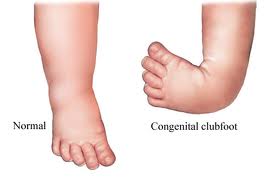On this page
Introduction
This leaflet is aimed at pregnant women who have a suspected finding of talipes on ultrasound examination.
What is talipes?
The full name for talipes is Congenital Talipes Equinovarus. Congenital means it is present at birth. Talipes refers to the foot and ankle. Equinovarus refers to the position of the foot.
In this condition, the baby’s foot points inwards and downwards so the baby has a high heel, and the sole of the foot is turned inwards.
It is sometimes known as clubfoot, and can affect one or both feet.

How common is it?
Talipes can affect 1 in 1000 births. It affects both feet in 50% of babies with talipies.
What causes it?
The cause for this condition is not entirely understood, however it is not due to anything you did or did not do during your pregnancy. Talipes occurs when the muscles on the outer side of the leg are weaker than those on the inside of the leg. The tendons on the inside of the leg also become shorter than normal preventing the foot from straightening into the normal position. Talipes can run in families. It can also be associated with the position of baby in the womb, particularly if there is not much fluid around baby.
In rarer situations, talipes can be associated with additional problems in the baby such as a generalised problem with how the muscles and joints function or an underlying chromosomal abnormality. During your Fetal Medicine appointment you will have a detailed ultrasound scan performed to check your baby in detail to rule out such problems. You may also be offered an amniocentesis test. This involves introducing a fine needle into your abdomen and taking a small amount of amniotic fluid from around the baby. The amniotic fluid can then be tested at our cytogenetics laboratory to rule out chromosomal problems in the baby (See separate information leaflet).
What does it mean for your baby?
In the vast majority of situations the condition is an isolated problem and the baby will be well at birth. Your baby will not experience any pain or discomfort due to this condition and the diagnosis will not change the plan for how, where or when the baby is delivered.
How is it treated?
A well-known successful treatment called the Ponseti method will be used to treat your baby following birth. This will involve specialist input from the physiotherapy team with the aim to slowly manipulate the foot into the usual position, allowing the foot to function normally.
The baby will be seen as an outpatient, where the foot will be carefully manipulated into the correct position before a plaster cast is applied. A series of these appointments and plaster casts will be needed over several weeks until the foot is in the normal position. Many babies need an additional small procedure to loosen the tendon at the back of their ankle (Achilles tendon). This can be done using local anaesthetic.
Your baby will need to wear special boots to hold the foot in the new corrected position. The boots will need to be worn 23 hours a day for the first three months of their lives then only worn at night and at nap times until they are 4 to 5 years old, to reduce the risk of recurrence. Normal footwear can be worn the remainder of the time.
What happens next?
You will be offered a detailed scan in the Fetal Medicine Unit where the doctor will confirm the presence of talipes, and check your baby carefully for any other abnormalities. Not all problems can be identified on scan, but if anything else is found, it will be discussed with you. The option of any useful additional tests will also be discussed with you.
Will it happen again?
If your baby has talipes, there is a 3% chance that any subsequent children that you have may also develop this condition.
Who else can I contact for support?
A useful source of information is the Steps website, a national organisation for families of children with lower limb problems:
http://www.steps-charity.org.uk/
For further information
For further information please contact:
Fetal Medicine Department,
Royal Victoria Infirmary
(0191) 2825837
Monday –Friday 9-5pm
Be sure to ask questions to the doctor supplying you with this leaflet and make a note of any questions you would like to ask at your next Fetal Medicine Unit appointment.
Antenatal Results and Choices
0845 077 2290 or 0207 713 7486 via mobile
North of Tyne Patient Advice and Liaison Service (PALS)
0800 0320202
Monday to Friday 9.00-4.30pm (answer phone out of hours)
Email: [email protected]
Resource Information
Information produced by Lesley Walker (Fetal Medicine Clinical Lead)
Date 22/08/2019
Updated by Angela Lightfoot: 21/07/2023
Review date: July 2026